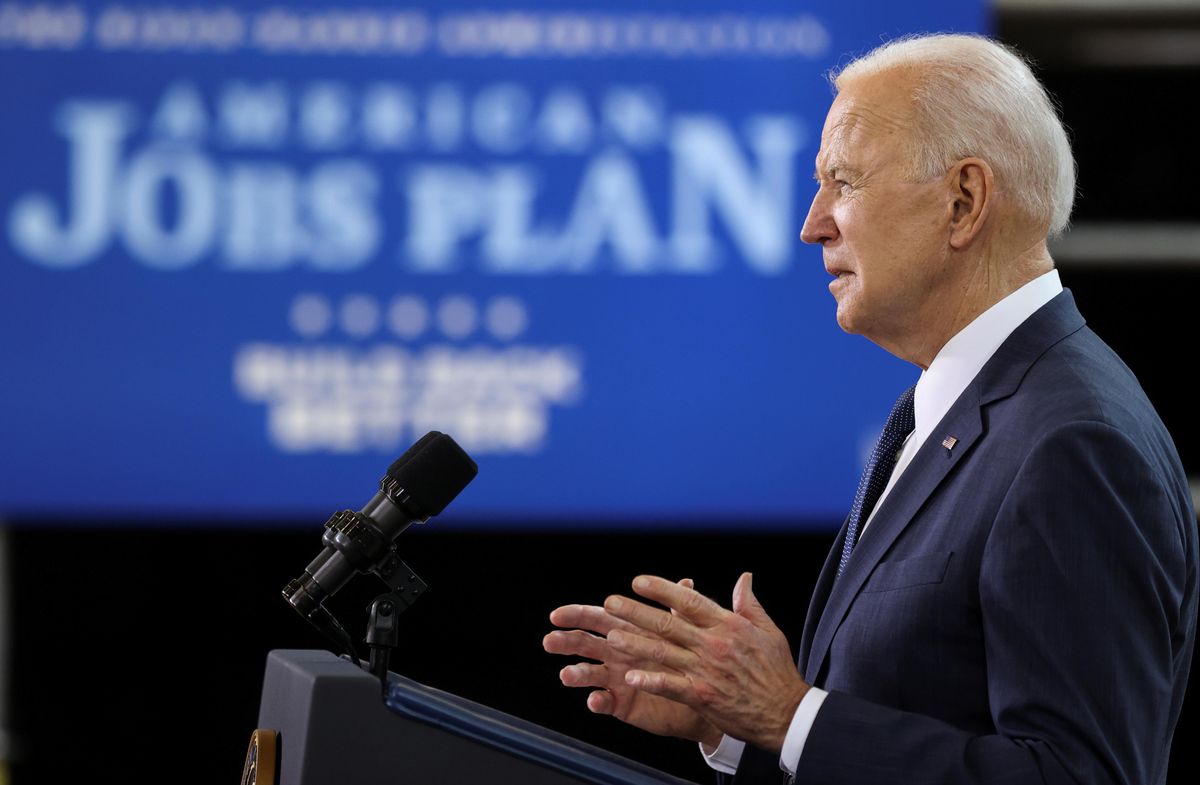Well, after years of endless "infrastructure weeks" to nowhere, Joe Biden is now aiming for the moon.
On Wednesday, the US president unveiled a $2 trillion dollar plan that would rebuild tens of thousands of miles of dilapidated roads and rails, modernize ports and airports, boost employment and housing, expand broadband access, and accelerate the transition to a more climate-friendly economy. By the time it's all over, the total spending could rise to $4 trillion over a decade.
This is the most ambitious US infrastructure agenda in many decades. It vastly exceeds anything that Biden's two predecessors attempted. In fact, nothing of this scale has been tried at least since the construction of the interstate highway system in the 1950s. In some ways it invites comparison with the public works programs of FDR's New Deal or with the social aims of Lyndon B. Johnson's Great Society programs.
That's because Biden's proposal is about more than just building rails, bridges, electric cars, and the like. It's a bold attempt to revive a once-powerful idea in America: that the government can and should act expansively to reshape and improve society at large. Critics of that idea either object on philosophical grounds (arguing that more government means less liberty) or financial ones (running up the national debt is bad.)
Getting Biden's plan through Congress would upend a nearly 40-year trend of governments under both parties largely rolling back the federal government's presence in American life. Barack Obama's expansion of healthcare was the only major exception to that and it was, as a result, hugely contentious.
In principle, Biden's plan is a political winner. Three-quarters of Americans support a makeover for the country's crumbling infrastructure. Despite being the world's wealthiest country, the US ranks just 13th in overall infrastructure quality.
But as always, there are stark partisan differences here too. A majority of Democrats and independents support hiking taxes on the wealthy to pay for infrastructure, while a majority of Republicans either oppose new infrastructure spending altogether or think it should be paid for without tax increases. For the record, Biden's plan at the moment claims it would pay for itself over the course of 15 years via tax hikes on the wealthy and corporations.
In Congress, Republican leaders won't get on board with a plan of this size, not least because it envisions a sizable increase in the corporate tax rate, and because it contains more green initiatives than the current GOP is comfortable with.
But Democrats are at least as much of an obstacle here as the GOP. There's already a battle brewing within the Democratic caucus about the spending plans. Progressives, led informally by New York Representative Alexandria Ocasio-Cortez, are already up in arms because they think the proposal is too small. Rather than spending $2 trillion over a decade, they want to spend five times as much over the same period. But moderate Dems — including the crucial Democratic swing voters of the Senate, Joe Manchin of West Virginia and Kyrsten Sinema of Arizona — are already balking at the cost and potential tax hikes.
And whereas the urgency of averting mass death smoothed party divisions when it came to the $1.9 trillion COVID stimulus bill, this one will spark a much fiercer battle for the soul of the Democratic party.
So, how are they going to pass this thing? There's virtually no chance of getting 10 Republican votes, which means that either Dems have to take the plunge and scrap the filibuster (which in effect forces lawmakers to get 60 Senate votes to pass most major pieces of legislation), or try to pass the measure through a simple-majority process called "budget reconciliation", which applies for bills that affect taxation and spending. Another question is whether the Biden administration decides to break up elements of the plan into smaller bills, or go for one massive history-making shot on goal.
Whatever Dems are gonna do, they have to do it fast. As the 2022 elections loom, Democrats know they have to use the moment or (potentially) lose it — midterms are historically unkind to the party in power, and the Democrats are working with a razor thin majority to begin with.


















